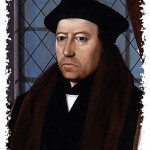 A brief sketch from the pages of Reformation history.
A brief sketch from the pages of Reformation history.
Nathan Busenitz serves on the pastoral staff of Grace Church and teaches theology at The Master’s Seminary in Los Angeles. He a crowd of curious spectators packed University Church in Oxford, England. They were there to witness the public recantation of one of the most well-known English Reformers, a man named Thomas Cranmer.
Cranmer had been arrested by Roman Catholic authorities nearly three years earlier. At first, his resolve was strong. But after many months in prison, under daily pressure from his captors and the imminent threat of being burned at the stake, the Reformer’s faith faltered. His enemies eventually coerced him to sign several documents renouncing his Protestant faith.
In a moment of weakness, in order to prolong his life, Cranmer denied the truths he had defended throughout his ministry, the very principles upon which the Reformation itself was based.
Roman Catholic Queen Mary I, known to church history as “Bloody Mary,” viewed Cranmer’s retractions as a mighty trophy in her violent campaign against the Protestant cause. But Cranmer’s enemies wanted more than just a written recantation. They wanted him to declare it publicly.
And so, on March 21, 1556, Thomas Cranmer was taken from prison and brought to University Church. Dressed in tattered clothing, the weary, broken, and degraded Reformer took his place at the pulpit. A script of his public recantation had already been approved; and his enemies sat expectantly in the audience, eager to hear his clear denunciation of the evangelical faith.
But then the unexpected happened. In the middle of his speech, Thomas Cranmer deviated from his script. To the shock and dismay of his enemies, he refused to recant the true gospel. Instead, he bravely recanted his earlier recantations.
Finding the courage he had lacked over those previous months, the emboldened Reformer announced to the crowd of shocked onlookers:
I come to the great thing that troubles my conscience more than any other thing that I ever said or did in my life: and that is, the setting abroad of writings contrary to the truth, which here now I renounce and refuse, as things written with my hand [which were] contrary to the truth which I thought in my heart, [being] written for fear of death, and to save my life.
Cranmer went on to say that if he should be burned at the stake, his right hand would be the first to be destroyed, since it had signed those recantations. And then, just to make sure no one misunderstood him, Cranmer added this: “And as for the pope, I refuse him, as Christ’s enemy and antichrist, with all his false doctrine.”
Chaos ensued.
Moments later, Cranmer was seized, marched outside, and burned at the stake.
True to his word, he thrust his right hand into the flames so that it might be destroyed first. As the flames encircled his body, Cranmer died with the words of Stephen on his lips: “Lord Jesus, receive my spirit. I see the heavens open and Jesus standing at the right hand of God.
